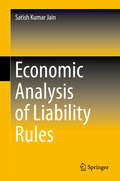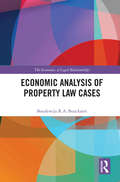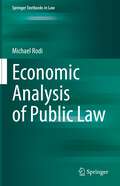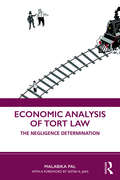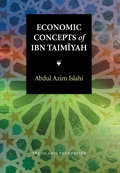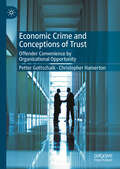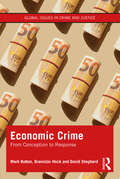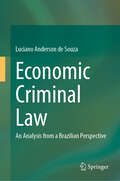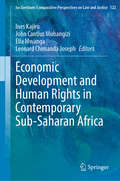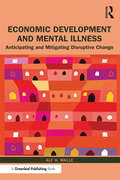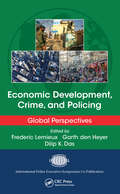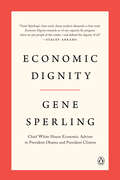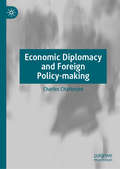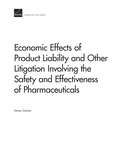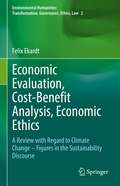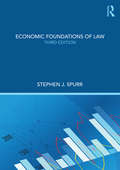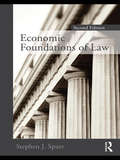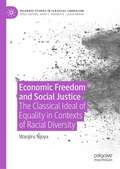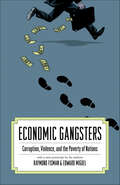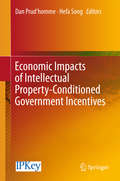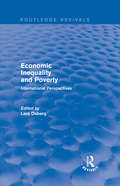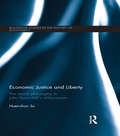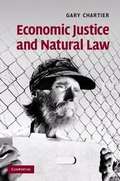- Table View
- List View
Economic Analysis of Liability Rules
by Satish Kumar JainThis book focuses on the analysis of liability rules of tort law from an efficiency perspective, presenting a comprehensive analysis of these rules in a self-contained and rigorous yet accessible manner. It establishes general results on the efficiency of liability rules, including complete characterizations of efficient liability rules and efficient incremental liability rules. The book also establishes that the untaken precaution approach and decoupled liability are incompatible with efficiency. The economic analysis of tort law has established that for efficiency it is necessary that each party to the interaction must be made to internalize the harm resulting from the interaction. The characterization and impossibility theorems presented in this book establish that, in addition to internalization of the harm by each party, there are two additional requirements for efficiency. Firstly, rules must be immune from strategic manipulation. Secondly, rules must entail closure with respect to the parties involved in the interaction giving rise to the negative externality, i. e. , the liability must not be decoupled.
Economic Analysis of Property Law Cases: A Casebook (The Economics of Legal Relationships)
by Boudewijn R. BouckaertThe discipline of law and economics has earned a reputation for developing plausible and empirically testable theories on the social functions and the impact of legal institutions. Property rights are a field in which this has been very successful. In this book, economic property rights theories are applied to case law in order to examine the practice and solution of real life conflicts. The author examines the economic problems which are dealt with in these cases and evaluate the courts’ decisions from an economic angle. Cases are examined from across the UK, the US, Germany, Belgium and Canada to allow international comparisons to be made. These comparisons reveal that, regardless of the legal system, many legal issues have similar economic roots and therefore similar models of economic analysis can be applied. The analysis of these cases also shows that the discipline of law and economics is not only successful in developing explanatory models but also useful to generate better considerations and solutions for legal conflicts in individual cases. This book aims to bridge the gap between the academic and professional literature and demonstrate the benefits of the economic analysis of property rights cases to all those who are interested in law and economics.
Economic Analysis of Public Law (Springer Textbooks in Law)
by Michael RodiThis textbook analyses from an economic perspective the phenomena of public law, the constitution, the democratic and political process, federalism, NGOs, administration and state decisions. It also examines selected fields of administrative law, including finance and tax law, public economic law and environmental law. Although the book uses examples from different legal orders, it maintains a focus on continental European law, as it aims to advance the law and economics approach in Europe.
Economic Analysis of Tort Law: The Negligence Determination
by Malabika PalThis book looks at the negligence concept of tort law and studies the efficiency issue arising from the determination of negligence. It does so by scrutinizing actual court decisions from three common law jurisdictions – Britain, India and the United States of America. This volume fills a very significant gap, scrutinizing 52 landmark judgments from these three countries, by focussing on the negligent affliction of economic loss determined by common law courts and how these findings relate to the existing theoretical literature. By doing so, it examines the formalization of legal concepts in theory, primarily the question of negligence determination and liability, and their centrality in theories concerning tort law. This book will be very helpful for students, professors and practitioners of law, jurisprudence and legal theory. It will additionally be of use to researchers and academics interested in law and economics, procedure and legal history.
Economic Analysis, Moral Philosophy, and Public Policy
by Michael S. Mcpherson Daniel M. HausmanThis 2006 book shows through accessible argument and numerous examples how understanding moral philosophy can improve economic analysis, how moral philosophy can benefit from economists' analytical tools, and how economic analysis and moral philosophy together can inform public policy. Part I explores rationality and its connections to morality. It argues that in defending their model of rationality, mainstream economists implicitly espouse contestable moral principles. Part II concerns welfare, utilitarianism and standard welfare economics, while Part III considers important moral notions that are left out of standard welfare economics, such as freedom, rights, equality, and justice. Part III also emphasizes the variety of moral considerations that are relevant to evaluating policies. Part IV then introduces technical work in social choice theory and game theory that is guided by ethical concepts and relevant to moral theorizing. Chapters include recommended readings and the book includes a glossary of relevant terms.
Economic Concepts of Ibn Taimiyah
by Abdul Azim IslahiThis valuable work presents Ibn Taimiyah's thoughts on the concept of Islamic economics, the state in the economy, on public finance, money, interest, prices, partnership, and profit-sharing, and offers a comparison of his ideas with those of some medieval scholars in Europe, along with a study of his influence on Islamic thinkers in later periods.
Economic Crime and Conceptions of Trust: Offender Convenience by Organizational Opportunity
by Petter Gottschalk Christopher HamertonEconomic Crime and Conceptions of Trust explores the intricacies of the contemporary concept of trust in episodes of misconduct through an analysis of workplace deviance and crime. Grounded in detailed examinations of contemporary case studies and bolstered by original comparative fieldwork, the text takes an offender-focused approach, emphasizing the pivotal role of convenience. Adopting an interdisciplinary perspective, the authors seek to enhance and broaden existing understanding of white-collar and corporate criminology, while also highlighting its relevance to strategic management studies. A core argument of the book is that the traditional emphasis on individual actors and notions of trustworthiness when conceptualising white-collar has waned in recent times. The authors’ perspective revisits and builds upon this important foundational concept of late twentieth-century discourse within the discipline, signalling a need for a reassessment and highlighting a number of recent conceptual developments to evaluate and position trust within the twenty-first century globalized business sphere.
Economic Crime: From Conception to Response (Global Issues in Crime and Justice)
by Mark Button David Shepherd Branislav HockThis book is the first attempt to establish 'economic crime' as a new sub-discipline within criminology. Fraud, corruption, bribery, money laundering, price-fixing cartels and intellectual property crimes pursued typically for financial and professional gain, have devastating consequences for the prosperity of economic life. While most police forces in the UK and the USA have an ‘economic crime’ department, and many European bodies such as Europol use the term and develop strategies and structures to deal with it, it is yet to grain traction as a widely used term in the academic community. Economic Crime: From Conception to Response aims to change that and covers: definitions of the key premises of economic crime as the academic sub-discipline within criminology; an overview of the key research on each of the crimes associated with economic crime; public, private and global responses to economic crime across its different forms and sectors of the economy, both within the UK and globally. This book is an essential resource for students, academics and practitioners engaged with aspects of economic crime, as well as the related areas of financial crime, white-collar crime and crimes of the powerful.
Economic Criminal Law: An Analysis from a Brazilian Perspective
by Luciano Anderson SouzaThis book investigates the legitimacy of Economic Criminal Law. Initially, it examines the history of the intersection between criminal law and economy, aiming at finding a possible evolutionary trait. Then it defines what is meant by Economic Criminal Law, and whether it would be necessary and possible to subsume it to the protected interest theory. Subsequently it analyzes theories that intend to equate the administratisation of criminal law, highlighting the proposed administrative-punitive. Finally, the conclusion searches for the best legal construction of the rules for economic infractions, limiting the role of criminal law in this context. The imperiousness of effective protection of the economic environment seems undeniable today. The structure of post-industrial capitalist system reveals, paradoxically, features unwanted by the existing mode of production, which the contemporary sociology understands as the reflexivity of risk society. In this sense, the economic agents undertake conduct detrimental to the conformation of the economic society, undermining the smooth functioning of the economy itself. In this context, the law, especially the criminal law, is used to try to head them off. It happens that such employment of legal and judicial branch clashes with their traditional boundaries, delineated since the Enlightenment. Complex economic behavior are criminally prohibited, in most cases through typifying proactive formulations, which are inconsistent and display as mere means of behavioral conformation, subject to administrative jurisdiction, which leads to the administrativization of the criminal law.
Economic Development and Human Rights in Contemporary Sub-Saharan Africa (Ius Gentium: Comparative Perspectives on Law and Justice #122)
by Ines Kajiru John Cantius Mubangizi Elia Mwanga Leonard Chimanda JosephThis book explores the connections between economic development and the protection of human rights. Drawing on experiences from Sub-Saharan African countries, the book demonstrates how various economic activities impact the protection of human rights in Sub-Saharan Africa. The book explores the core concepts and principles, theory and practice, accountability mechanisms, and key challenges to the protection of human rights in Sub-Saharan Africa in the era of global economic development. It also shows the ways in which human rights law and development can be used to obtain relief for the victims of environmental degradation or adverse effects of climate change in Africa. In addition, it places emphasis on development and economic policies to highlight the pros and cons of using human rights-based approaches and its significance in the context of economic development and human rights in Africa. The book is divided into three parts: Part I focuses on the conceptual and theoretical foundations of human rights and economic developments in Africa and covers essential concepts, historical perspectives, the African human rights framework, human rights litigation, and comparative approaches. Part II addresses the intersection of economic development and human rights in Sub-Saharan Africa, including human rights and individual liberties in the context of economic empowerment of citizens; human rights and the development of regional economic integration; human rights and economic independence; human rights and the economic empowerment of vulnerable groups; and human rights and cultures. The third and final part focuses on challenges and prospects of human rights and the economy in Sub-Saharan Africa by taking a closer look at human rights and globalization, cultural relativism, science and technology, state sovereignty, and governance structures and systems. The book is intended for researchers, policymakers, university students, and practitioners in international human rights law, environmental law, natural resources law and development.
Economic Development and Mental Illness: Anticipating and Mitigating Disruptive Change
by Alf H. WalleSocial, economic, and technological changes disrupt many Indigenous, ethnic, and rural communities even when offering progress. Under these conditions, social and psychological dysfunctions are likely to emerge. This book provides insights regarding how to anticipate, prevent, and, when necessary, provide mitigation strategies to communities and individuals who suffer as a result. This book, the first of its kind, provides an overview of strategic and policy issues involving the relationship between change and dysfunction, enabling the reader to more effectively deal with potentially hurtful influences in proactive, equitable, and culturally sensitive ways. After providing a theoretical overview, methods for anticipating the hurtful impacts of change are discussed, along with techniques for mitigating its negative effects upon communities and individuals. Learning objectives and discussion questions are included with each chapter, and the book can serve as a text for courses on indigenous economic development, Native studies, culturally appropriate business, and culturally competent therapy. It can also be used as a professional handbook for practitioners working with communities affected by these issues.
Economic Development, Crime, and Policing: Global Perspectives (International Police Executive Symposium Co-Publications)
by Dilip K. Das Frederic Lemieux Garth Den HeyerThe 22nd Annual Meeting of the International Police Executive Symposium was held in August 2012 at the United Nations Plaza in New York. Chaired by Dr. Garth den Heyer, the symposium focused on the links between economic development, armed violence, and public safety. Drawn from these proceedings, Economic Development, Crime, and Policing: Global P
Economic Dignity
by Gene SperlingFrom one of our wisest and most influential economic thinkers, the only person to serve as Director of the National Economic Council under two Presidents, a profound big-picture vision of why the promotion of dignity should be the singular end goal by which we chart America's economic futureWhen Gene Sperling was in charge of coordinating the shaping and execution of the US government's economic policy in the Obama White House, he found himself surprised and dismayed when serious people in Washington worried out loud to him that the Obama focus on health care was a distraction because it was "not focused on the economy." How, he asked, was millions of Americans' fear that they were a single pink slip or a loved one's serious illness away from financial ruin somehow not considered an economic issue? To him, it was just one more example of a more profound truth he witnessed in his many years in our national economic debate: that when it comes to America's economic policy, there is too little focus on what the end goal should be.Too often, he found that our economic debate confused ends and means; that we measured economic success by metrics like GDP instead of whether the economy was succeeding in lifting up the sense of meaning, purpose, fulfillment, and security of people. Too often, he found debates framed by old divisions or pro-market ideology that increasingly failed to capture whether economic policy was fostering exploitation, economic insecurity, and disillusionment that were too often invisible within our current framework. Now more than ever, at a moment when the very capacity of modern capitalism to avoid accelerating inequality, a hollowed-out middle class, and structural poverty is being questioned, we need to step back and reflect on our ultimate goals.Economic Dignity is Sperling's effort to do just that - to frame our thinking about the way forward in a time of wrenching economic change. His argument combines moral and intellectual seriousness with actual high-level policy experience. Economic dignity, Sperling maintains, can be seen as resting on three pillars. The first: the capacity to care for family without economic deprivation denying people the capacity to experience its greatest joys - the birth of one's children, the companionship of a loving partner, the love of family and friends, the fulfillment that comes from providing. The second: the right to the pursuit of potential and purpose, including the right to first and second chances - the right to a life of active striving. The third: economic participation with respect and without domination and humiliation. All three pillars are rooted in the highest and most noble values of the American project. But getting there is the rub, and in Economic Dignity, Sperling offers paths that policymakers and citizens can follow for years to come. As he puts it, if you live in times when major steps forward are needed, it is important to be clear on your destination - or at least to know the North Star that is guiding you. His answer, in two words, is economic dignity.
Economic Diplomacy and Foreign Policy-making
by Charles ChatterjeeThis book aims to identify what components are needed for economic diplomacy in today’s rapidly changing world, looking at the nature, focus and tenets of economic diplomacy, and the differences between economic diplomacy and commercial diplomacy. Further, it considers the new kind of diplomacy that will be required for emerging markets, in contrast to maintaining the traditional techniques used for economic diplomacy between states. The author emphasises the negotiating techniques necessary for successfully engaging in economic diplomacy in the current diplomatic atmosphere. Importantly, it also discusses how to pursue economic diplomacy at international fora and with regard to private foreign investments. Lastly, it addresses the role of non-governmental organisations in economic diplomacy. Given its scope, the book will benefit not only practicing diplomats, but also graduate students.
Economic Effects of Product Liability and Other Litigation Involving the Safety and Effectiveness of Pharmaceuticals
by Steven GarberLiability effects on the economic performance of the pharmaceutical industry play a prominent role in the debate about the economic effects of product liability in the United States. The author analyzes incentive effects on company decisions, implications for economic outcomes such as drug safety and effectiveness, and suggests how public policy changes could mitigate liability-based sources of inefficient decisions of pharmaceutical companies.
Economic Evaluation, Cost-Benefit Analysis, Economic Ethics: A Review with Regard to Climate Change – Figures in the Sustainability Discourse (Environmental Humanities: Transformation, Governance, Ethics, Law)
by Felix EkardtWith cost-benefit analysis, economic sciences cultivate a specific decision-making procedure, which has also been partially adopted in politics. Although economists do not experience the approach as normative, on closer examination the approach can be identified as an economic ethics. The present philosophical and at the same time transdisciplinary (with special legal and economic components) treatment examines the persuasive power of this approach using climate change as an example, as the most important sustainability issue. The objections raised against the economisation of decision-making with regard to the utilitarian tradition, such as the criticism of the orientation towards weighing up options, the alleged lack of distributive justice or the tendency to describe people in behavioural science as selfish, are hardly or not at all convincing on closer examination. In several respects, however, it turns out that cost-benefit analysis faces insoluble problems. Firstly, the theoretical basis of (hidden normative) cost-benefit analysis in philosophical empiricism does not seem tenable. This means the idea of empiricism that normative questions must be transformed into questions of factual (countable and reproduceable) preferences of people. Secondly, there are massive collisions of cost-benefit analysis with a liberal-democratic constitutional law, whose principles are universal ethical principles. This concerns both freedom rights (which must not depend on the ability of humans to pay) and the model of democracy and respect for the rule of law. Thirdly, insoluble problems of application arise for cost-benefit analyses, which are particularly (but not only) apparent in the context of climate protection, in general considerations as in the case of legislation as well as in individual analyses, as done when constructing a coal-fired power plant. A strongly deflated cost-benefit analysis could nevertheless contribute factual material – such as partial aspects of decision consequences that can actually be depicted in monetary terms – to ethical or legal decision-making processes. In this respect the approach appears helpful and complementary, but not beyond that.
Economic Foundations of International Law
by Eric A. Posner Alan O. SykesThe ever-increasing exchange of goods and ideas among nations, as well as cross-border pollution, global warming, and international crime, pose urgent questions for international law. Here, two respected scholars provide an intellectual framework for assessing these pressing legal problems from a rational choice perspective. The approach assumes that states are rational, forward-looking agents which use international law to address the actions of other states that may have consequences for their own citizens, and to obtain the benefits of international cooperation. It further assumes that in the absence of a central enforcement agency-that is, a world government-international law must be self-enforcing. States must believe that if they violate international agreements, other states will retaliate. Consequently, Eric A. Posner and Alan O. Sykes devote considerable attention to the challenges of enforcing international law, which begin with the difficulties of determining what it is. In the absence of an international constitution, the sources for international law are vague. Lawyers must rely on statements contained in all manner of official documents and on simple observation of states’ behavior. This looseness leads international institutions such as the United Nations to deliver conflicting interpretations of the law’s most basic principles. The authors describe the conditions under which international law succeeds or fails, across a wide range of issues, including war crimes, human rights, international criminal law, principles of state responsibility, law of the sea, international trade regulation, and international investment law.
Economic Foundations of Law
by Stephen J. SpurrThe third edition of Economic Foundations of Law introduces readers to the economic analysis of the major areas of the law: property law, torts, contracts, criminal law, civil procedure, corporation law and financial markets, taxation, and labor law. No prior knowledge of law is required, but a prior course in the principles of microeconomics would be quite helpful. The text opens with a review of the basic principles of price theory and an overview of the legal system, to ensure readers are equipped with the tools necessary for economic analysis of the law. The third edition provides expanded or new coverage of key topics including intellectual property law, how the creation of new forms of property rights affects the conservation of species such as elephants and fish, controversies involving liability for medical malpractice and class actions, the transformation of personal injury litigation by the intervention of insurance companies as plaintiffs, how to predict the outcome of litigation with game theory, an economic analysis of the ownership and use of guns, bankruptcy law and the economics of bank regulation. Comprehensive and well-written, this text is a compelling introduction to law and economics that is accessible to both economics and law students.
Economic Foundations of Law second edition
by Stephen SpurrEconomic Foundations of Law (2nd ed.) provides an economic analysis of the major areas of the law: property law, torts, contracts, criminal law, civil procedure, corporation law and financial markets, taxation and labor law. In line with current trends in legal scholarship, discussion is focused on economic principles such as risk aversion, efficiency, opportunity cost, moral hazard, rent-seeking behaviour and economies of scale. Accessible, comprehensive and well written, this book uses extensive practical examples and explanations to illustrate key points. There are numerous applications to lawyers and the legal profession, with detailed discussions of subjects as diverse as the proposed market for transplantable human organs, the market for adoptions, the market for bail bonds, the unanticipated effects of Megan’s law, and issues of racial profiling. Fully updated and revised, a new chapter on labor law has also been included.
Economic Freedom and Social Justice: The Classical Ideal of Equality in Contexts of Racial Diversity (Palgrave Studies in Classical Liberalism)
by Wanjiru NjoyaThis book analyses the egalitarian foundations of equality law from a classical liberal perspective by asking two central questions: does justice ideally demand equality? Are differences in abilities among people in some sense unfair? The book examines these questions in the context of racial diversity. Racial justice as a component of social justice is often considered to be so emotionally and morally compelling that its implications for economic freedom are rarely subjected to critical scrutiny. In defending the classical ideal of formal equality in contexts of racial diversity this book questions the ethical status of egalitarian social and moral ideals. Economic Freedom and Social Justice argues that egalitarian ideals, like all subjective value judgements, must be subjected to critical intellectual inquiry rather than treated axiomatically. Drawing upon the legal framework in the UK and other common law jurisdictions, this book shows some of the ways in which egalitarian ideals, in addition to resting on false premises, are costly, harmful, and ultimately inimical to justice and liberty. The book argues that legal entitlements and policy guidelines constructed upon notions of racial equity are wrongly constituted as the main prism through which liberal market democracies govern private relationships, including the employment relationship. Written in a clear and forthright style, this book will be of interest to students and scholars in law, economics, philosophy and political economy.
Economic Gangsters: Corruption, Violence, and the Poverty of Nations
by Edward Miguel Ray FismanGetting inside the heads of the developing world’s dictators, warlords, and corrupt politiciansMeet the economic gangster. He's the United Nations diplomat who double-parks his Mercedes on New York City streets at rush hour because the cops can't touch him—he has diplomatic immunity. He's the Chinese smuggler who dodges tariffs by magically transforming frozen chickens into frozen turkeys. The dictator, the warlord, the unscrupulous bureaucrat who bilks the developing world of billions in aid. The calculating crook who views stealing and murder as just another part of his business strategy. And, in the wrong set of circumstances, he might just be you.In Economic Gangsters, Raymond Fisman and Edward Miguel take readers into the secretive, chaotic, and brutal worlds inhabited by these lawless and violent thugs. Join these two sleuthing economists as they follow the foreign aid money trail into the grasping hands of corrupt governments and shady underworld characters. Spend time with ingenious black marketeers as they game the international system. Follow the steep rise and fall of stock prices of companies with unseemly connections to Indonesia's former dictator. See for yourself what rainfall has to do with witch killings in Tanzania—and more.Fisman and Miguel use economics to get inside the heads of these "gangsters," and propose solutions that can make a difference to the world's poor—including cash infusions to defuse violence in times of drought, and steering the World Bank away from aid programs most susceptible to corruption.In a new postscript, the authors look at how economists might use new tools to better understand, and fight back against, corruption and violence in the aftermath of the 2008 financial crisis. Take an entertaining walk on the dark side of global economic development with Economic Gangsters.
Economic Impacts of Intellectual Property-Conditioned Government Incentives
by Dan Prud'Homme Hefa SongThis book provides new insights into the economic impacts, strategic objectives and legal structures of an emerging branch of government incentives conditioned on meeting intellectual property-related requirements. Despite becoming more common in recent years, such incentives - ranging from patent fee subsidies and patent box tax deductions to inventor remuneration schemes - are still under-researched. A diverse range of analytical methods, including econometric analyses, case studies and comparative legal analysis, are used to study these incentives in countries in Europe and China. Scholars, policymakers and practitioners can benefit from the conceptual and practical insights as well as policy recommendations provided.
Economic Inequality and Poverty: International Perspectives (Routledge Revivals Ser.)
by Lars OsbergThis title was first published in 1991: This collection focuses on the concepts and measurements of inequality, poverty, the concentration of wealth, and the implications of these issues for social policies. A special feature of this work is the international comparisons of the evidence on economic inequality.
Economic Justice and Liberty: The Social Philosophy in John Stuart Mill’s Utilitarianism (Routledge Studies in the History of Economics #157)
by Huei-chun SuThis new book reopens the debate on theories of justice between utilitarian theorists and scholars from other camps. John Rawls’ 1971 publication of A Theory of Justice put forward a devastating challenge to the long-established dominance of utilitarianism within political and moral philosophy, and until now no satisfactory and comprehensive utilitarian reply has yet been put forward. By expounding John Stuart Mill’s system of knowledge and by reconstructing his utilitarianism, Huei-chun Su offers a fresh and comprehensive analysis of Mill’s moral philosophy and sheds new light on the reconciliation of Mill’s idea of justice with both his utilitarianism and his theory of liberty. More than a study of Mill, this book uses a systematic framework to draw a comparison between Mill’s theory of justice and those of John Rawls, Amartya Sen, and Friedrich von Hayek. It hence establishes common ground between different schools of thought in the fields of economics and philosophy, and enables more effective dialogue. This book will be indispensable both to those interested in Mill’s moral philosophy and to those seeking a solid theoretical basis for analyzing the idea of justice, as well as to anyone with an interest with the history of economics, economic philosophy and the history of economic thought more generally.
Economic Justice and Natural Law
by Gary ChartierGary Chartier elaborates a particular version of economic justice rooted in the natural law tradition, explaining how it is relevant to economic issues and developing natural law accounts of property, work, and economic security. He examines a range of case studies related to ownership, production, distribution, and consumption, using natural law theory as a basis for staking positions on a number of contested issues related to economic life and highlighting the potentially progressive and emancipatory dimension of natural law theory.
